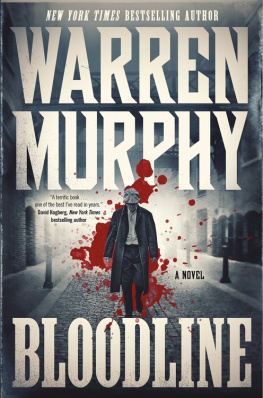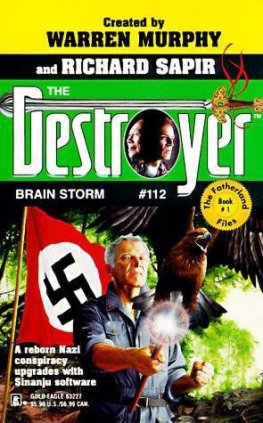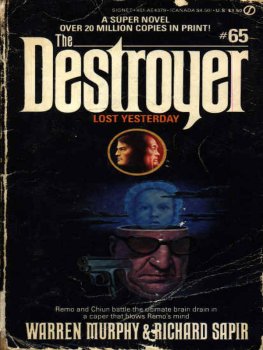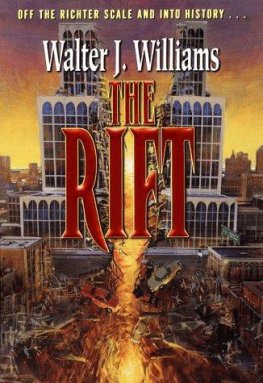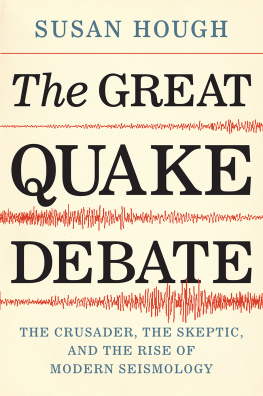***********************************************
* Title : #005 : DR QUAKE *
* Series : The Destroyer *
* Author(s) : Warren Murphy and Richard Sapir *
* Location : Gillian Archives *
***********************************************
CHAPTER ONE
Every man owes God a life. California owes Him a disaster, payable about twice a century.
For those people not hurled hundreds of feet in shifting earth; for those not buried alive in their homes along with the fear-triggered refuse of their bodies; for those not deposited deeper than any gravedigger's plan, these disasters are considered a simple geological adjustment. A releasing of pressure.
They are the result of an earth wound called the San Andreas fault, one of the many faults in California which make it a geological time bomb with a multitude of fuses. All of them burning.
The San Andreas fault runs six hundred miles from Baja California in the South to Mendocino in the North. It is created by the Pacific Plate on the earth's surface going northwest and the North American Continental Plate going southeast at a speed of several inches of year. The seam between those two plates runs the length of California, and when the two plates bump ... earthquake.
In one small area, east of Los Angeles, in San Aquino County, the plates lock together every so often, building up pressure. When they unlock, about twice every hundred years, nature pays its bi-centennial dues as the plates unleash their tension. For human beings within a few hundred miles, as the earth along the fault lurches, the universe appears to be ending.
For some of them it does.
Many geologists believe the next un-springing of the lock will make any nuclear weapons so far devised look like spears and stones. California is due for a bloodletting unrivalled in recorded history, so say these geologists. It will be in five minutes or in thirty years, but it will be. The earth only waits ... with the human sacrifices enjoying the California sun until their moment in the pit ... a moment in time known only to God.
It was therefore considered unbelievable when official Washington was approached by a man with a plan to harness this terror. And later, it was considered unthinkable that anyone would purposely trigger this disaster.
Unthinkable, until a government geologist in Washington, D.C. heard a detailed account of something he could not believe.
"But that's impossible," he said. "That's as impossible as ... impossible as...."
"Impossible as throwing people into ovens," said the harried visitor from San Aquino County, California.
CHAPTER TWO
It was impossible. But it was happening right on time.
Birds took flight. Rabbits scurried crazily across the vine-covered fields. Three squirrels scrambled up the dirt road, ignoring cover. Trees swayed, showering leaves like green confetti. Thin red dust rose from the San Aquino countryside as if someone were dynamiting the bowels of California.
Four leading citizens of San Aquino and the county sheriff looked at their watches and groaned, almost in unison. They stood beside a well-polished Lincoln limousine at the entrance of the Gromucci farm where Sheriff Wade Wyatt assured them they could probably see best what would happen, while not being seen looking for it.
"We don't want to let 'em know we're scared, you know," he had told them.
So now the sun was hot, the dust-clogged air made breathing difficult and it had happened.
"I don't believe it," said Harris Feinstein, owner of Feinstein's Department Store. "I see it, but I don't believe it. Does your watch read 3:55 P.M., Les?"
"Yes," said Lester Curpwell IV, president of the First Aquino Trust and Development Company. "Three fifty five. Right on time to the second." Curpwell was in his mid-fifties, taller than Feinstein by an inch and a half, his face strong and smooth, able to show concern but not worry, a face that planned but never schemed. He wore a dark pinstriped suit with white snirt and Princeton tie.
Feinstein was more Hollywood, deeply tanned, his face evidencing meditation and tenderness. He wore a blue blazer and white slacks. Curpwell's shoes were polished black cordovan, Feinstein's soft Italian leather.
"They can do it then," said Feinstein. "Well, we know they can do this much at least," said Curpwell.
"If they can do this, they can do more," said Feinstein.
"That's right," butted in Sheriff Wade Wyatt. "They said they can do anything. Make any kind of earthquake they want. A little ripple like this. Or boom. The whole works." He waved with his hands, indicating a massive explosion.
"I just don't want to believe it," Feinstein said. "It looks like a barrage, like after a barrage," said Dourn Rucker, president of Rucker Manufacturing Company. "You know, the dust and everything. Like after a barrage."
"All right. There are good points. We should think about the positive points," said Sonny Boydenhousen, president of Boydenhousen Realty and president of the San Aquino Chamber of Commerce. He was, like Rucker, over six feet tall. Both had pleasant bland faces and bellies going slightly potward. When they wore identical clothes, some people mistook them for twins. Today, they wore gray suits with pink shirts.
"There may be good points," he insisted. "Look, they've showed us they can make an earthquake. But they say they can prevent them. Now if they can, that's great. It'll do wonders for real estate values here. Do you think they're reliable, Wade?"
"I don't know," said Sheriff Wyatt. "All I know's that they did what they said they was going to."
Wyatt was a red-faced balloon of a man with a neat Stetson and a diamond and ruby chip American flag pin in his collar. He wore a .44 with five notches in the grip. He had put the five notches in himself with his own hand, carving very carefully. He said they represented five men. What they represented was a cut finger.
"Eight thousand dollars a month is not a bad price. I say eight thousand dollars a month is reasonable," said Boydenhousen.
"Like after a barrage," said Rucker, still gazing at the dusty field. "Like after a barrage."
"Impossible," said Feinstein.
"Two thousand dollars too much for you?" asked Wyatt, a hint of contempt in his voice. He avoided Curpwell's angry glare. He did not want another lecture on anti-semitism.
"It's not the money. I'd give ten times that for education. I've given more than fifty times that to the hospital. But this is blackmail money. Extortion money. Do you believe that? Do you know what country this is, Wade?"
"America, Mr. Feinstein, in God blessed America." His chest rose when he said that and he hoisted up his gunbelt lest the sudden loss of belly let it slip to the ground. He had always had trouble with Feinstein, whose bleeding heart seemed always to bleed for the troublemakers, the riffraff, the loafers. Not for businessmen or sheriffs or the good people who made San Aquino one of the nicest little counties in the world.
They had been told they could keep it that way, too, if everyone kept his head and was reasonable.
After all, it was a very reasonable proposition. Sheriff Wyatt had been contacted by people over the telephone. They told him they could make earthquakes. As he related it, Sheriff Wyatt had told them to go to hell.
They told him there would be an earthquake the next day at noon. And there was. The smallest possible. Just a tremor. Then they called again. This time, they said, they would give San Aquino another little gift. This time, a number two on the Mercalli intensity scale which measures earthquakes. Birds and small animals would be affected by it and you could feel it in your feet if you stood in an open field. It would happen at 3:55 p.m.
They told Wyatt that they could also deliver the kind of earthquake that buried cities and made civilizations disappear. But they weren't unreasonable. They could also guarantee no earthquakes. And all it would cost was $8,000 a month-$2,000 each from the county's four leading citizens. All very reasonable.
Next page

